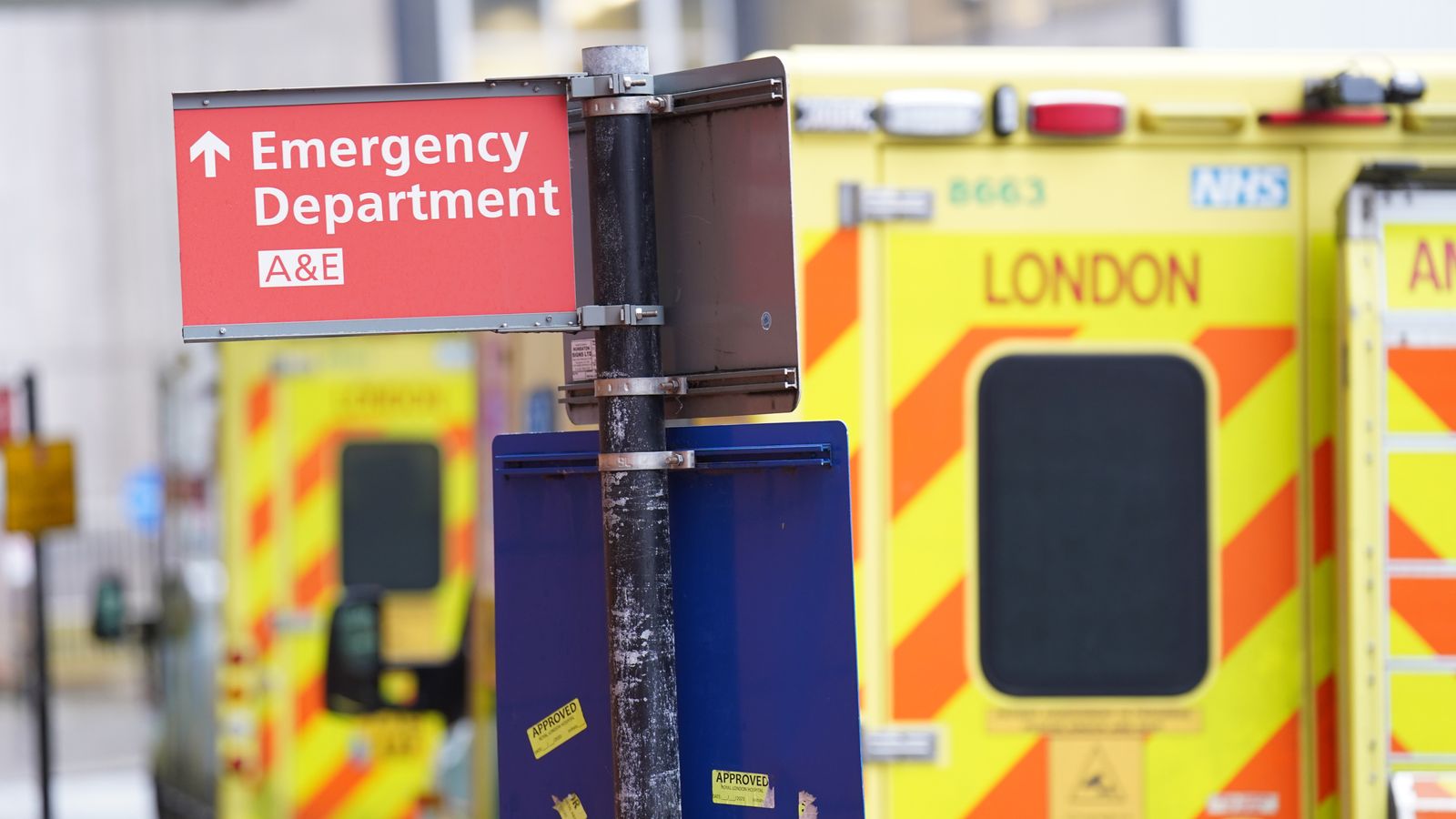Emergency care suggests a rapid response, but it’s a sector debilitated by delays.
Patients wait for their 999 call to be answered, for paramedics to arrive, for ambulance crews to hand them over to hospital teams. They crowd A&E waiting rooms, being treated on trolley, chairs – even the floor – while they wait to be admitted.
The worst outcome of delays is death. This week a senior doctor warned up to 500 people could be dying each week as a result of problems with emergency care.
But what happens to a patient’s body and condition while they wait for care?
Even where the worst outcome is avoided, delays can cause a patient to deteriorate and develop complications, requiring more treatment and longer hospital stays.
As staff and resources are stretched, care is “diluted”, vice president of the Royal College of Emergency Medicine Dr Maya Naravi told Sky News.
She said long ambulance waits mean by the time a patient is seen in A&E, their problems have compounded.
An elderly person who falls
Dr Navari says: “If you’re lying on the floor, and you’ve had nothing to eat or drink for days, with a fractured hip, then not only are you dealing with the acute fracture of the hip, but often we’re dealing with issues such as hypothermia, pressure sores as a result of lying on a hard floor for so long, problems with severe dehydration and the kidney function, potentially added pneumonia.”
Complications that arise from delays can create further problems, she explained. If someone is dehydrated, paramedics may struggle to get fluids or antibiotics into them, or a CT scan for a stroke might have to wait until a patient has been warmed up.
Read more:
How much are NHS failings to blame for rising excess deaths?
NHS ‘not working’, says wife of cancer patient treated in ‘filthy’ cubicle
Sunak urged to recall parliament to discuss ‘NHS crisis’
With soaring A&E waiting times – a third of patients waited more than four hours in October – Dr Naravi, who is a consultant in emergency medicine at Bradford Royal Infirmary, said it was inevitable to see patients rapidly deteriorate during their wait.
That could mean a patient having a cardiac arrest in the middle of a corridor or a child fitting in a waiting room – incidents that were distressing for the patient, the people waiting around them and staff.
Waiting too long for care after you’ve had a stroke
For stroke patients, getting rapid treatment can mean the difference between recovery and a return to independence, or lifelong disability. For every minute a stroke goes untreated, 1.9 million brain cells die.
The “clot-busting” treatment thrombolysis needs to be given within four-and-a-half hours of the onset of symptoms, while there’s a six-hour window to perform surgery to reopen a blocked artery in the brain, Professor Martin James told Sky News.
Prof James is a stroke consultant at the Royal Devon and Exeter Hospital and runs SSNAP, the largest stroke data capture project in the UK. The data shows over the last 18 months about 1,000 fewer people across England, Wales and Northern Ireland have received clot busting treatment than were being treated before the pandemic.
Several hundred of those have likely been left with disabilities – paralysis, loss of speech, disruption to their cognition – because they did not get treated in time, potentially leaving them reliant on carers.
“Obviously, that can have lifelong consequences for the patient, but also long-term consequences for the health service,” he added.
Heart attack patients
For patients who have had a heart attack, every minute matters, said Professor Nick Mills, British Heart Foundation professor of cardiology at the University of Edinburgh and consultant interventional cardiologist at the Royal Infirmary of Edinburgh.
“The diagnosis of a heart attack requires rapid treatment, because the longer you wait, the more heart muscle dies and the less likely you are to survive, and the more likely you are to go on and develop failure in the future. Minutes mean muscle.”
He said while NHS Scotland had continued to prioritise patients calling 999 with acute chest pain, he was concerned by people saying they did not want to seek medical help because they knew about the pressures facing the NHS.
“If patients choose not to phone for help… then they will inevitably present late with larger heart attacks and be much more likely to die.”
He urged people who were concerned about their heart not to delay getting help: “We are working 24/7, and we want to see them as soon as possible.”
More than 24 hours stuck in an ambulance
A paramedic in the East of England, who wished to remain anonymous, told Sky News they have had patients waiting more than 25 hours to be offloaded from an ambulance.
“Sometimes we hand patients over to an oncoming crew, come back the next day and take over the same patient. I spend most of my 12-hour shifts in the back of an ambulance with patients.”
They said it was “not uncommon” to hear seven or eight uncovered category one calls – life-threatening calls that should be responded to in seven minutes – go uncovered in a shift.










